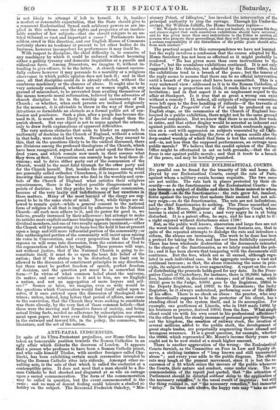ANTI-PAPAL INDECENCIES.
IN spite of its Ultra-Protestant prejudices, our Home Office has taken an honourable position towards the Roman Catholics in an ugly affair which disturbs the decorum of London. It appears that a person who professes to have been a Roman Catholic priest, and who calls himself Teodor, with another foreigner called. Chy- linski, has been exhibiting certain mock ceremonies intended to bring the Roman Catholic rites into ridicule. Amongst other re- velting acts, is the sale of that which is called the encharist at a contemptible price. It does not need that a man should be a Ro- man Catholic to feel shocked and disgusted at so vile in outrage upon a sacred commemoration. The form of the commemoration may be called in question but the event commemorated is the same ; and no man of decent feeling could tolerate a studied ri- baldry on the subject. - The Reverend Frederick Oakeley, "Mis- sionary Priest, of Islington," has invoked the intervention of the principal authority to stop the outrage. Through his Under-Se- cretary, Su. William J'olliffe, the Home Secretary replies— "Mr. Walpole has not hesitated, and does not hesitate, to express his deep and sincere regret that such scandalous exhibitions should have occurred ; and he has given more than once instructions to the Police to caution all persons who promote these proceedings; that they will bring upon themselves a serious responsibility if any disturbance of the public peace should arise from such conduct."
The practical sequel to this correspondence we have not learned but the reply involves a confession that the course adopted by the Home Secretary has not been so effectual as it might probably be rendered. "Re has given more than once instructions to the Police" but the scandalous exhibitions continued. It is not only suggested by Mr. Oakeley, but admitted by the Home Office, that the exhibitions tend to a breach of the peace; but the tenons of the reply seems to assume that there can be no official intervention until breach of the peace shall have been committed. This is a very untoward view : addressed as it is to the Roman Catholics, of whom so large a proportion are Irish, it reads like a very needless invitation • and in that aspect it is an unpleasant sequel to the affair at Stockport. Is it true that so great a wrong can exist without a remedy? If, indeed, all subjects of religious veneration were left open to the free handling of ridicule—if the travestie of Proudhon's Le Propriete c'est le Vol could be produced on an English stage, or the ceremonies of the Church of England bur- lesqued in a public exhibition, there might not be the same ground of special complaint But we know that there is no such free trade in satire, and that either display would be arrested as indecent and against public morals. Surely the satire which confounds aggres- sion on a sect with aggression on subjects venerated by all Chris- tian sects—which in assailing the fos•m of a dogma assails also the deep-seated worship of which that form is but the external stand- ard—is, not less than the supposed performances, an outrage upon public morals ? We believe that the candid opinion of the Home Office might be effectuated in act on both grounds,—that the of- fence is one against public morals ; and that it tends to a breach of the peace, and may be lawfully punished.


























 Previous page
Previous page